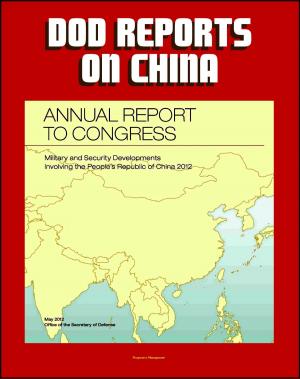Decisionmaking in Operation Iraqi Freedom: Removing Saddam Hussein by Force - The Surge, General Casey, General Raymond Odierno, General David Petraeus, Ambassador Khalilzad
Nonfiction, History, Military| Author: | Progressive Management | ISBN: | 9781311698612 |
| Publisher: | Progressive Management | Publication: | November 25, 2014 |
| Imprint: | Smashwords Edition | Language: | English |
| Author: | Progressive Management |
| ISBN: | 9781311698612 |
| Publisher: | Progressive Management |
| Publication: | November 25, 2014 |
| Imprint: | Smashwords Edition |
| Language: | English |
In 1946, General Walter Bedell Smith wrote a series of articles describing six great decisions made in World War II by General Dwight David Eisenhower, for whom General Smith worked as Chief of Staff, Allied Expeditionary Forces. Writing so soon after the war, General Smith could not hope to produce a definitive history, but felt that writing then would document an important viewpoint of one of the major participants in Eisenhower's many significant decisions.
With this initial volume of its Operation IRAQI FREEDOM Key Decisions Monograph Series, the Strategic Studies Institute (SSI) also attempts to write about key decisions while they are still fresh in the memories of the participants. As with General Smith's articles, this series will not produce a definitive history; that is still years away. However, the series will make a major contribution to understanding decisions made by senior military and civilian leaders during the several years thus far of the war in Iraq. I am pleased to inaugurate the series, which looks more at the how and why of certain decisions than at the results of those same decisions. This will be particularly useful to senior leaders — both uniformed and civilian—as they reflect on how decisions were made regarding Iraq and how better decisions might be made in future conflicts.
Without taking anything away from Eisenhower's momentous decisions, they seem in some ways to be simpler than those made over the past 8-plus years for the planning and execution of Operation IRAQI FREEDOM. As General James Mattis at Joint Forces Command recently said, the challenges of operating in a counterinsurgency can be greater than in large-scale conventional combat, "since the adversary has more flexibility to determine how, when, where, and whether to fight." This fact—plus the fact that irregular combat is the more likely challenge of the future operating environment—makes it even more important to examine the key decisions of Operation IRAQI FREEDOM as soon as possible.
The Strategic Studies Institute (SSI) is pleased to initiate its latest monograph series, Operation IRAQI FREEDOM Key Decisions. SSI started this project in an effort to give leaders of the U.S. Armed Forces some important insights into how military advice was provided to the Nation's civilian leadership during the many years—including the months before the invasion—of the war in Iraq. Understanding the ways that military leaders advise those who exercise civilian control over the military is important for the continuing prosecution of that war, but also for the inevitable next time that the United States considers embarking on such an endeavor. A second objective of this series is to provide military and civilian leaders a clearer picture of what they must do to ensure that U.S. Armed Forces are properly prepared—with strategy, doctrine, force structure, equipment, training, and leadership—for future operations.
Literature about the war in Iraq is already extensive, although—as the Foreword states — the definitive history of the war is still undoubtedly years away. However, most of the writing—by policymakers, journalists, scholars, and other students of national security issues — focuses on the effects of various decisions, not on the decisions themselves. For example, there is ample writing about how the 2003 decision to "de-Ba'athify" the Iraqi government was executed and what effects it had. How that decision was made, though, has been studied less. With this series, SSI intends to make a valuable addition to the literature on the war in Iraq by addressing the how and why of various key strategic decisions that were made over the past 8-plus years of planning and fighting. Some of the effects will inevitably be discussed as well, but the focus will clearly be on the decisionmaking processes, not the subsequent results.
In 1946, General Walter Bedell Smith wrote a series of articles describing six great decisions made in World War II by General Dwight David Eisenhower, for whom General Smith worked as Chief of Staff, Allied Expeditionary Forces. Writing so soon after the war, General Smith could not hope to produce a definitive history, but felt that writing then would document an important viewpoint of one of the major participants in Eisenhower's many significant decisions.
With this initial volume of its Operation IRAQI FREEDOM Key Decisions Monograph Series, the Strategic Studies Institute (SSI) also attempts to write about key decisions while they are still fresh in the memories of the participants. As with General Smith's articles, this series will not produce a definitive history; that is still years away. However, the series will make a major contribution to understanding decisions made by senior military and civilian leaders during the several years thus far of the war in Iraq. I am pleased to inaugurate the series, which looks more at the how and why of certain decisions than at the results of those same decisions. This will be particularly useful to senior leaders — both uniformed and civilian—as they reflect on how decisions were made regarding Iraq and how better decisions might be made in future conflicts.
Without taking anything away from Eisenhower's momentous decisions, they seem in some ways to be simpler than those made over the past 8-plus years for the planning and execution of Operation IRAQI FREEDOM. As General James Mattis at Joint Forces Command recently said, the challenges of operating in a counterinsurgency can be greater than in large-scale conventional combat, "since the adversary has more flexibility to determine how, when, where, and whether to fight." This fact—plus the fact that irregular combat is the more likely challenge of the future operating environment—makes it even more important to examine the key decisions of Operation IRAQI FREEDOM as soon as possible.
The Strategic Studies Institute (SSI) is pleased to initiate its latest monograph series, Operation IRAQI FREEDOM Key Decisions. SSI started this project in an effort to give leaders of the U.S. Armed Forces some important insights into how military advice was provided to the Nation's civilian leadership during the many years—including the months before the invasion—of the war in Iraq. Understanding the ways that military leaders advise those who exercise civilian control over the military is important for the continuing prosecution of that war, but also for the inevitable next time that the United States considers embarking on such an endeavor. A second objective of this series is to provide military and civilian leaders a clearer picture of what they must do to ensure that U.S. Armed Forces are properly prepared—with strategy, doctrine, force structure, equipment, training, and leadership—for future operations.
Literature about the war in Iraq is already extensive, although—as the Foreword states — the definitive history of the war is still undoubtedly years away. However, most of the writing—by policymakers, journalists, scholars, and other students of national security issues — focuses on the effects of various decisions, not on the decisions themselves. For example, there is ample writing about how the 2003 decision to "de-Ba'athify" the Iraqi government was executed and what effects it had. How that decision was made, though, has been studied less. With this series, SSI intends to make a valuable addition to the literature on the war in Iraq by addressing the how and why of various key strategic decisions that were made over the past 8-plus years of planning and fighting. Some of the effects will inevitably be discussed as well, but the focus will clearly be on the decisionmaking processes, not the subsequent results.















